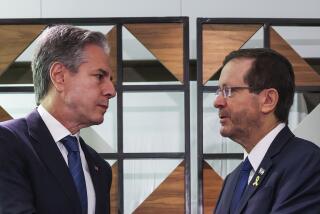Olmert invites Arab talks
JERUSALEM — Israeli Prime Minister Ehud Olmert, warming to a Saudi peace initiative, issued a surprise invitation Sunday to Arab leaders to meet with him in Jerusalem and exchange ideas for settling the Israeli-Palestinian conflict.
He also said he would be willing to join moderate Arab leaders and the Palestinian Authority president for the same purpose if King Abdullah of Saudi Arabia were to convene such a summit.
“I think it is time to make a momentous effort in order to give a push to the diplomatic process,” Olmert said at a news conference here with German Chancellor Angela Merkel.
There was no immediate reaction from Arab leaders.
The 2002 Saudi proposal, revived last week at a meeting of Arab nations in Riyadh, the Saudi capital, offers Israel peace and acceptance in the region in return for its withdrawal from lands it captured in the 1967 Middle East War, including the West Bank, Golan Heights and East Jerusalem. It also demands that the Jewish state recognize the “right of return” of Palestinians displaced by Israel’s founding in 1948 and their descendants.
Olmert made it clear Sunday that his reservations about the terms demanded of Israel had not softened. But his openness to a regional summit was unexpected, given Israel’s skepticism about the plan and its historical aversion to multilateral peace talks in which the Jewish state would be outnumbered.
“It is not essential that the things they will say and the things we will say will be identical at this stage,” Olmert said. “But the actual holding of such a meeting, where they could present all their ideas and we could present our ideas, is certainly something worth an effort.”
Israel rejected the Saudi plan when it was first proposed. Israeli leaders have said they are willing to give up land for peace and allow the creation of a neighboring Palestinian state but would never agree to a full return to the 1967 borders. They have rejected the return of refugees to what is now Israel, saying the new Palestinian state should be the refugees’ homeland.
Olmert was categorical in weekend interviews with Israeli journalists, saying his government would not allow the return of a single Palestinian refugee.
In the same interviews, however, he called renewed Arab endorsement of the Saudi plan “a revolutionary change in outlook.”
It indicates that a bloc of Sunni Muslim Arab states, alarmed by the nuclear ambitions of Shiite Muslim Iran, “understands that they may have been wrong to think that Israel is the world’s greatest problem,” he said.
The idea of a regional summit was floated last week by U.S. officials traveling in the region with Secretary of State Condoleezza Rice. They said efforts were underway to arrange a meeting among Israel, the Palestinian Authority, pro-Western Arab states and the so-called quartet of Mideast negotiators: the U.S., the European Union, the United Nations and Russia.
Such a gathering would be the broadest multinational Mideast peace forum since the 1991 Madrid conference, which was followed by secret Israeli-Palestinian contacts and a series of interim peace accords.
Olmert, seizing on the idea Sunday, became the first to propose it publicly.
“I invite for a meeting all Arab heads of state, including, of course, the king of Saudi Arabia, whom I regard as an important leader, in order to engage in dialogue,” he announced.
Olmert said that if the king initiated such a meeting and invited him and Palestinian Authority President Mahmoud Abbas to receive the Saudi proposals, “we will come to hear them and we will be glad to voice ours.”
It is unclear whether Saudi Arabia would be willing to hold or attend a meeting with Israel. Despite its peace initiative and its alliance with the U.S., the kingdom maintains a formal state of war and a policy of no contacts with the Jewish state.
But the Saudi initiative has set off a flurry of other diplomatic activity to move Israeli-Palestinian talks into a broader arena. Those talks, between Olmert and Abbas, began in December and had stalled because the Islamic militant group Hamas, which shares power with Abbas’ faction, refuses to forswear violence against Israel or recognize the Jewish state.
“We are going through a period where we feel that things are moving,” Merkel said in a speech at Jerusalem’s Hebrew University before meeting with Olmert. “There is a window of opportunity, ... a real chance of reaching a breakthrough, and we must grasp it.”
Saeb Erekat, an aide to Abbas, said he hoped Olmert’s invitation presaged Israeli acceptance of the Saudi plan. But Israeli Vice Premier Shimon Peres said Israel regarded the plan only as an Arab negotiating position.
Some Israeli lawmakers said they were baffled by Olmert’s announcement, noting that he had rejected Syria’s calls for negotiations and refused to discuss substantive land-for-peace issues with Abbas.
Miri Eisin, Olmert’s spokeswoman, said Israel was willing to talk to Syria if its leaders would “openly take steps to stop supporting terrorism.”
She said Olmert had asked U.S. Rep. Nancy Pelosi (D-San Francisco), speaker of the House, in a meeting here Sunday to convey that message to Syrian President Bashar Assad when she sees him this week.
Pelosi’s staff declined to comment on the request. But the speaker said she would ask Assad about two Israeli soldiers captured by the Shiite Muslim militant group Hezbollah and a third captured by Hamas and other Palestinian militants last summer. Hezbollah and Hamas have close ties to Syria.
Dan Bartlett, counselor to President Bush, said Sunday that the White House had asked Pelosi not to go to Syria.
*
More to Read
Sign up for Essential California
The most important California stories and recommendations in your inbox every morning.
You may occasionally receive promotional content from the Los Angeles Times.










